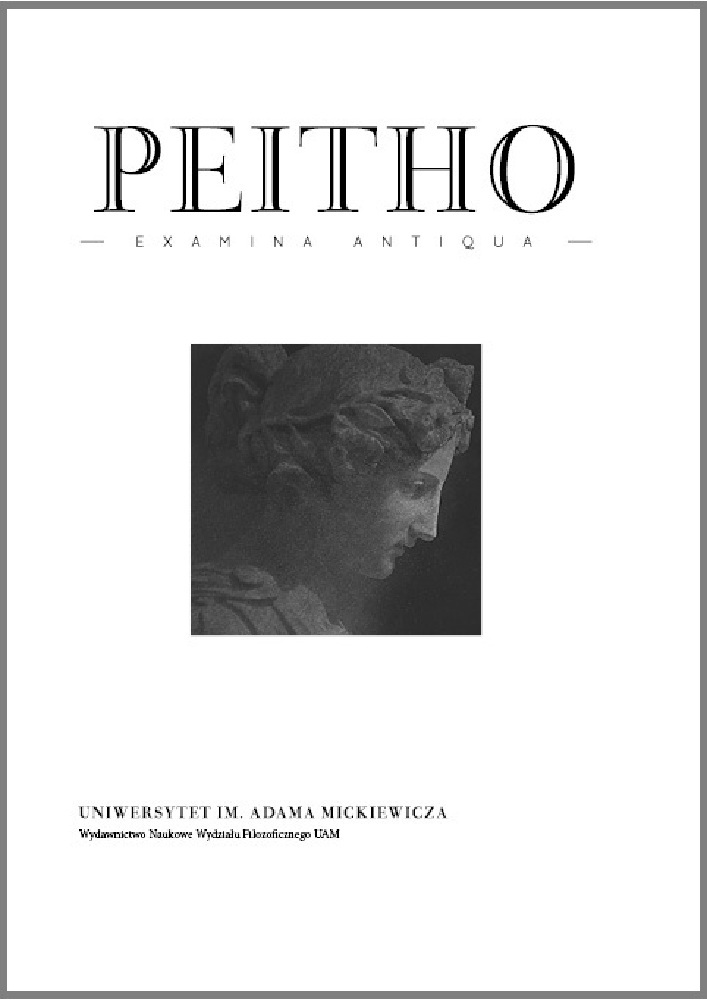Abstract
With respect to Parmenides’ thought Melissus was regarded as a dissident thinker already in antiquity. His polemical introduction of the concept of void and the relative idea of infinite Being seemed particularly controversial. The aim of the present paper is to examine the origins of the Melissian understanding of void in order to trace its philosophical genesis to the criticism of the Atomist Leucippus. According to the philosopher from Abdera, the Eleatic fundamental principles had to conform to the obviousness of bodies’ motion, which is why the Eleatic not-Being had to be understood as void. Melissus took issue with this view and criticized the idea of the void’s reality by means of a methodical argument. In the course of doing so, the philosopher from Samos distorted the original Parmenidean ontology, which is why his theories were often criticized severely as theoretically weak.
References
Andolfo, M., 2001., Atomisti antichi. Testimonianze e frammenti, Milano.
Reale, G., 1970, Melisso. Testimonianze e frammenti, Firenze.
Reale, G., 2006, I Presocratici. Testimonianze e frammenti, Milano.
Reale, G., Untersteiner, M., 2011, Eleati. Testimonianze e frammenti, Milano.
Ruggiu, L. (trad.), 2007, Aristotele, Fisica, Milano–Udine.
Ruggiu, L. (trad.), 2010, Parmenide, Poema sulla natura, Milano.
Abbate, M., 2010, Parmenide e i neoplatonici. Dall’essere all’Uno e al di là dell’Uno, Alessandria.
Andolfo, M., 2001, “L’ontologia degli atomisti come ‘capovolgimento’ di quella di Melisso nell’alveo dell’eleatismo”, in: M. Andolfo, Atomisti antichi. Testimonianze e frammenti, Milano, pp. 8–85.
Calogero, G., 1936, “La logica del secondo eleatismo”, Atene e Roma 14, pp. 141–170.
Cerri, G., 2016, “A Scholarch Denied: Leucippus, Founder of Ancient Atomism, in: G. Colesanti, L. Lulli (eds.), Submerged Literature in ancient Greek Culture, vol. II, Berlin–Boston, pp. 11–24.
Cordero, N. L., 2004, By Being, It Is, Las Vegas.
Curd, P. K., 1998, The Legacy of Parmenides. Eleatic Monism and later Presocratic Thought, Princeton.
Galgano, N. S., 2012, “Parmenide inventore del non-essere”, Bollettino della Società Filosofica Italiana 206, pp. 3–21.
Gomperz, T., 1932, “ΑΣΩΜΑΤΟΣ”, Hermes 67, pp. 155–167.
Furley, D., 1987, “The Greek Cosmologists”, vol. I: The Formation of the atomic Theory and Its earliest critics, Cambridge.
Kirk, G. S., Raven, J. E., 1957, The Presocratic Philosophers, Cambridge.
Klowski, J., 1971, “Antwortete Leukipp Melissos oder Melissos Leukipp?”, Museum Helveticum 28, pp. 65–71.
Mansfeld, J., 1988, “De Melisso Xenophane Gorgia. Pyrrhonizing Aristoelianism”, Rheinisches Museum für Philologie 131, pp. 239–276.
Mansfeld, J., 2016, Melissus between Miletus and Elea, Sankt Augustin.
Marcacci, F., 2009, Alle origini dell’assiomatica: glie Eleati, Aristotele, Euclide, Roma.
Matson, W. I., 1963, “Democritus, Fragment 156”, The Classical Quarterly 13, pp. 26–29.
McGibbon, D., 1964, “The Atomists and Melissus”, Mnemosyne 17, pp. 249–255.
Mourelatos, A. P. D., 1999, “Parmenides and the Pluralists”, Apeiron 32, pp. 117–129.
Palmer, J., 2009, Parmenides and Presocratic Philosophy, Oxford.
Popper, K. R., 1998, The World of Parmenides, London–New York.
Pulpito, M., 2015, Parmenide e la negazione del tempo, Milano.
Rapp, C., 2013, “Melissus aus Samos”, in: H. Flashar, D. Bremer, G. Rechenauer (hrsg.), Grundriss der Geschichte der Philosophie. Die Philosophie der Antike, Bd. 1: Frühgriechische Philosophie, Basel.
Rossetti, L., 2015, La filosofia non nasce con Talete e nemmeno con Socrate, Bologna.
Solmsen, F., 1969, The Eleatic One and Melissus, Amsterdam.
License
Peitho provides immediate open access to its content on the principle that making research freely available to the public supports a greater global exchange of knowledge.
